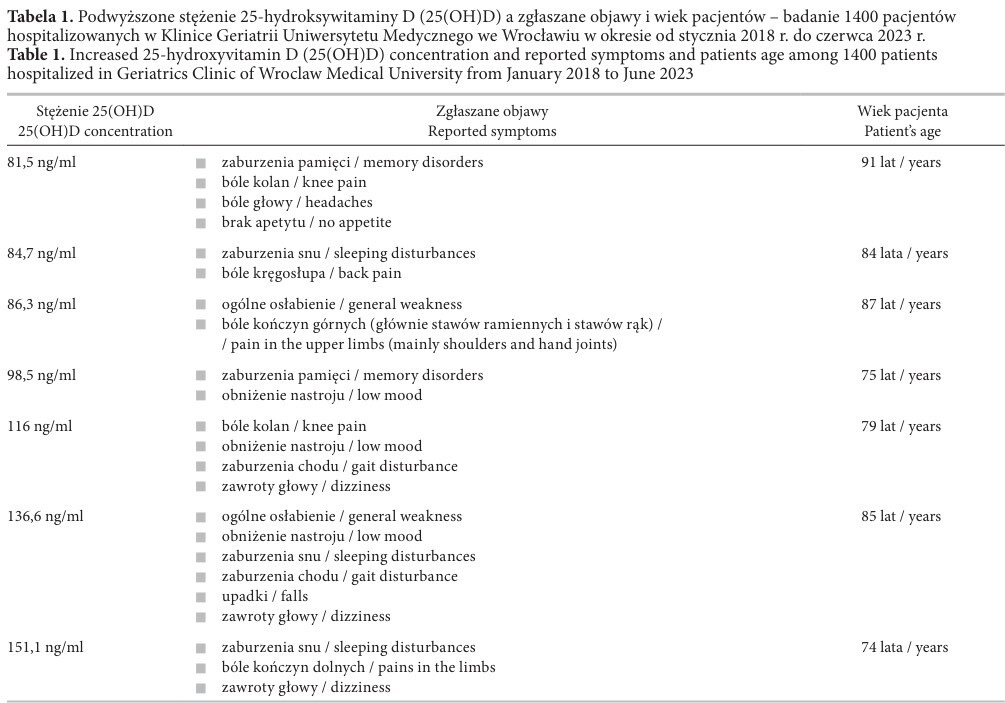Online first
Current issue
Archive
Most cited in 2024
About the Journal
Editorial Office
Editorial Board
Copyright and self-archiving policy
Information clause on the processing of personal data
Declaration of accessibility
Instructions for Authors
Instructions for Reviewers
Contact
Reviewers
2024
2023
2022
2020
2021
2019
2018
2017
2016
2015
2014
2013
Editing and translations
PRELIMINARY REPORT
The problem of increased vitamin D3 level in a group of patients hospitalized in a geriatrics clinic
1
Uniwersytet Medyczny im. Piastów Śląskich we Wrocławiu / Wroclaw Medical University, Wrocław, Poland (Wydział Lekarski, Katedra i Klinika Geriatrii / Faculty of Medicine, Clinical Department of Geriatrics)
Online publication date: 2024-06-26
Corresponding author
Joanna Żórawska
Uniwersytet Medyczny im. Piastów Śląskich we Wrocławiu, Wydział Lekarski, Katedra i Klinika Geriatrii, ul. Chałubińskiego 1a, 50-368 Wrocław
Uniwersytet Medyczny im. Piastów Śląskich we Wrocławiu, Wydział Lekarski, Katedra i Klinika Geriatrii, ul. Chałubińskiego 1a, 50-368 Wrocław
Med Pr Work Health Saf. 2024;75(3):286-92
KEYWORDS
TOPICS
ABSTRACT
Background: Taking into account the multi-directional beneficial effects of vitamin D3 and its widespread deficiency, regular supplementation is recommended. However, more and more attention is being paid to the risk of overdose with supplemented vitamin D3 and the associated serious health consequences. Material and Methods: The concentration of 25-hydroxyvitamin D (25(OH)D) is a routine test recommended upon admission to the Geriatrics Clinic of Wroclaw Medical University. The aim of the study was to analyze the results from January 2018 to June 2023. Additionally, information on the reported symptoms, gender and age of people with an increased level of vitamin D3 was collected. Results: Analyzing a group of 1400 patients, it was noted that within 5 years, vitamin D3 concentrations exceeding the recommended level were recorded in 7 patients, including 3 with toxic levels. All abnormal results occurred in women. The most frequently reported symptoms included general weakness, lower limbs and joint pain, sleep disorders, low mood. People with toxic concentrations reported dizziness. In seniors there is a gradual increase in vitamin D concentration and its deficiency is less common. Higher concentrations were recorded in the group of older seniors, and concentrations considered toxic occur in the population >74 years of age. Supplements and drugs with vitamin D are most often used without consulting a doctor, without determining the appropriate dose, or without assessing the concentration of 25(OH)D in the serum. Conclusions: To prevent vitamin D deficiency in seniors, doses >4000 IU daily are not recommended. It is advisable to check all medications and supplements taken at each doctor’s visit in terms of duplicating treatment with vitamin D. It is advisable to assess the status of vitamin D supply the concentration of 25(OH)D in order to select the appropriate dose. Assessment of 1,25-dihydroxyvitamin D concentration is recommended in cases of vitamin D toxicity. Med Pr Work Health Saf. 2024;75(3):286–292
Share
RELATED ARTICLE
We process personal data collected when visiting the website. The function of obtaining information about users and their behavior is carried out by voluntarily entered information in forms and saving cookies in end devices. Data, including cookies, are used to provide services, improve the user experience and to analyze the traffic in accordance with the Privacy policy. Data are also collected and processed by Google Analytics tool (more).
You can change cookies settings in your browser. Restricted use of cookies in the browser configuration may affect some functionalities of the website.
You can change cookies settings in your browser. Restricted use of cookies in the browser configuration may affect some functionalities of the website.






